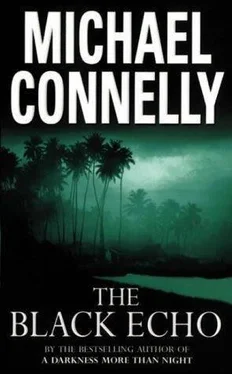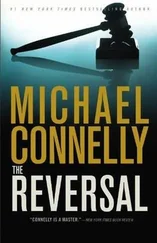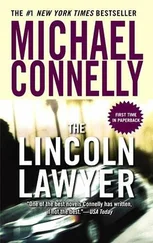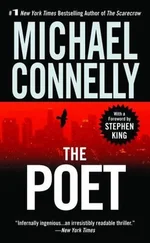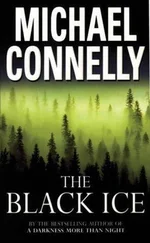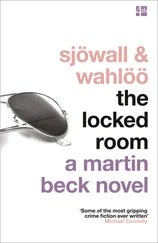“Show him the finger. Tell him there were no tracks in the pipe. Think of something. Tell him the DB was a guy who knew needles too well to’ve OD’d.”
Sakai put his head back against the van’s side panel and laughed loudly. Then he shook his head as if a child had made a joke.
“And you know what he’ll say to me? He’ll say that it doesn’t matter how long he’d been spiking. They all fuck up. Bosch, how many sixty-five-year-old junkies do you see around? None of them go the distance. The needle gets them all in the end. Just like this guy in the pipe.”
Bosch turned and looked around to make sure none of the uniforms were watching and listening. Then he turned back to Sakai’s face.
“Just tell him I’ll be by there later,” he said quietly. “If he doesn’t find anything on the prelim, then fine, you can stick the body at the end of the line in the hall, or you can park it down at the gas station on Lankershim. I won’t care then, Larry. But you tell him. It’s his decision, not yours.”
Bosch dropped his hand from the door and stepped back. Sakai got in the van and slammed the door. He started the engine and looked at Bosch through the window for a long moment before rolling it down.
“Bosch, you’re a pain in the ass. Tomorrow morning. It’s the best I can do. Today is no way.”
“First cut of the day?”
“Just leave us alone today, okay?”
“First cut?”
“Yeah. Yeah. First cut.”
“Sure, I’ll leave you alone. See you tomorrow, then.”
“Not me, man. I’ll be sleeping.”
Sakai rolled the window back up and the van moved away. Bosch stepped back to let it pass, and when it was gone he was left staring at the pipe. It was really for the first time then that he noticed the graffiti. Not that he hadn’t seen that the exterior of the pipe was literally covered with painted messages, but this time he looked at the individual scrawls. Many were old, faded together-a tableau of letters spelling threats either long forgotten or since made good. There were slogans: Abandon LA. There were names: Ozone, Bomber, Stryker, many others. One of the fresher tags caught his eye. It was just three letters, about twelve feet from the end of the pipe- Sha. The three letters had been painted in one fluid motion. The top of the S was jagged and then contoured, giving the impression of a mouth. A gaping maw. There were no teeth but Bosch could sense them. It was as though the work wasn’t completed. Still, it was good work, original and clean. He aimed the Polaroid at it and took a photo.
Bosch walked to the police van, putting the exposure in his pocket. Donovan was stowing his equipment on shelves and the evidence bags in wooden Napa Valley wine boxes.
“Did you find any burned matches in there?”
“Yeah, one fresh one,” Donovan said. “Burned to the end. It was about ten feet in. It’s there on the chart.”
Bosch picked up a clipboard on which there was a piece of paper with a diagram of the pipe showing the body location and where the other material taken from the pipe had been. Bosch noticed that the match was found about fifteen feet from the body. Donovan then showed him the match, sitting at the bottom of its own plastic evidence bag. “I’ll let you know if it matches the book in the guy’s kit,” he said. “If that’s what you’re thinking.”
Bosch said, “What about the uniforms? What’d they find?”
“It’s all there,” Donovan said, pointing to a wooden bin in which there were still more plastic evidence bags. These contained debris picked up by patrol officers who had searched the area within a fifty-yard radius of the pipe. Each bag contained a description of the location where the object had been found. Bosch took each bag out and examined its contents. Most of it was junk that would have nothing to do with the body in the pipe. There were newspapers, clothing rags, a high-heeled shoe, a white sock with dried blue paint in it. A sniff rag.
Bosch picked up a bag containing the top to a can of spray paint. The next bag contained the spray paint can. The Krylon label said it was Ocean Blue. Bosch hefted the bag and could tell there was still paint in the can. He carried the bag to the pipe, opened it and, touching the nozzle with a pen, sprayed a line of blue next to the letters Sha. He sprayed too much. The paint ran down the curved side of the pipe and dripped onto the gravel. But Bosch could see the colors matched.
He thought about that for a moment. Why would a graffiti tagger throw half a can of paint away? He looked at the writing on the evidence bag. It had been found near the edge of the reservoir. Someone had attempted to throw the can into the lake but came up short. Again he thought, Why? He squatted next to the pipe and looked closely at the letters. He decided that whatever the message or name was, it wasn’t finished. Something had happened that made the tagger stop what he was doing and throw the can, the top and his sniff sock over the fence. Was it the police? Bosch took out his notebook and wrote a reminder to call Crowley after midnight to see if any of his people had cruised the reservoir during theA.M. watch.
But what if it wasn’t a cop that made the tagger throw the paint over the fence? What if the tagger had seen the body being delivered to the pipe? Bosch thought about what Crowley had said about an anonymous caller reporting the body. A kid, no less. Was it the tagger who called? Bosch took the can back to the SID truck and handed it to Donovan.
“Print this after the kit and the stove,” he said. “I think it might belong to a witness.”
“Will do,” Donovan said.
***
Bosch drove down out of the hills and took the Barham Boulevard ramp onto the northbound Hollywood Freeway. After coming up through the Cahuenga Pass he went west on the Ventura Freeway and then north again on the San Diego Freeway. It took about twenty minutes to go the ten miles. It was Sunday and traffic was light. He exited on Roscoe and went east a couple of blocks into Meadows’s neighborhood on Langdon.
Sepulveda, like most of the suburban communities within Los Angeles, had both good and bad neighborhoods. Bosch wasn’t expecting trimmed lawns and curbs lined with Volvos on Meadows’s street, and he wasn’t disappointed. The apartments were at least a decade past being attractive. There were bars over the windows of the bottom units and graffiti on every garage door. The sharp smell of the brewery on Roscoe wafted into the neighborhood. The place smelled like a 4A.M. bar.
Meadows had lived in a U-shaped apartment building that had been built in the 1950s, when the smell of hops wasn’t yet in the air, gangbangers weren’t on the street corner and there was still hope in the neighborhood. There was a pool in the center courtyard but it had long been filled in with sand and dirt. Now the courtyard consisted of a kidney-shaped plot of brown grass surrounded by dirty concrete. Meadows had lived in an upstairs corner apartment. Bosch could hear the steady drone of the freeway as he climbed the stairs and moved along the walkway that fronted the apartments. The door to 7B was unlocked and it opened into a small living room-dining room-kitchen. Edgar was leaning against a counter, writing in his notebook. He said, “Nice place, huh?”
“Yeah,” Bosch said and looked around. “Nobody home?”
“Nah. I checked with a neighbor next door and she hadn’t seen anybody around since the day before yesterday. Said the guy that lived here told her his name was Fields, not Meadows. Cute, huh? She said he lived all by himself. Been here about a year, kept to himself, mostly. That’s all she knew.”
“You show her the picture?”
“Yeah, she made him. Didn’t like looking at a picture of a dead guy, though.”
Читать дальше
